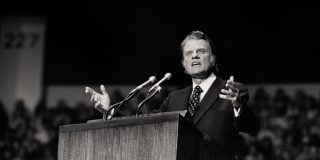It’s become a popular claim of the new atheists that teaching children religion amounts to child abuse. The latest to make this claim was Paul Ehrlich on the ABC’s Q and A program earlier this week.
According to Richard Dawkins, it’s acceptable to teach children about the existence of religion, but an act of child abuse to teach them to believe the tenets of any religion or to inculcate in them a sense that they belong to a particular religious tradition. This is a subset of the broader claim that religion is bad for you and bad for the world.
There is no doubt that religion can be used to justify violence, bigotry and fear. Christians only have to look back to the Inquisition or the hatred and disdain that sometimes accompanies Christian opposition to same-sex relationships. In the Middle East we see tragic examples of Islamic religion used to justify appalling violent crimes. But the same can be said of atheism, which gave us the Communist bloc and the murder of millions of Jews by Stalin. In each of these instances the problem was not Christian faith, Islamic faith, or atheism, but the expression of these in politically illiberal forms. Political illiberalism refuses to recognise the freedom of others to think and act differently and instead seeks to impose its will through the use of coercion and violence.
When practised in a politically liberal context, religion and atheism are freed from the need to coerce and can be powerful means for people to grow, find meaning, and live hopefully. This has been my experience a Christian and it is backed up by hard data.
First, consider charitable works. In March last year Pro Bono Australia published a list of the top five charities in this country in terms of the amount of income they raise.
1. World Vision
2. Salvation Army Eastern
3. Salvation Army Southern
4. Compassion Australia
5. Australian Red Cross
The first four are all Christian faith-based organisations, while the fifth, the Red Cross, is part of the International Red Cross, which was founded by the devoutly Christian man Henry Durant.
Second, consider civic involvement. In 2004 the Australia Bureau Of Statistics reported on the relationship between religion and volunteering (4102.0 – Australian Social Trends, 2004). It found that people who participated in church or religious activities were twice as likely to have volunteered in a welfare or community organisation (18% v 9%), and almost twice as likely to have volunteered for an organisation concerned with education, training or youth development (12% v 7%).
Third, consider the relationship between religion and mental health. In an article published by the ABC, John Dickson, Director of the Centre for Public Christianity, summarised some of the findings published in the Oxford Handbook of Religion and Health. Religion and spirituality have been found to be associated with greater hope; expectations of social support; lower rates of depression, faster recovery from depression; and less suicidal ideation, fewer suicidal attempts, and fewer completed suicides.
At the personal and anecdotal level history is replete with stories of people whose religious faith drove them to do great things. Many have become household names. Think Mother Theresa, Desmond Tutu, Martin Luther King, William Wilberforce, Florence Nightingale.
Yes religion can be used to bind people up and keep them trapped in fear. I experienced this firsthand in my fundamentalist youth. But that was only part of the story. Alongside the fear and guilt I experienced incredible love and a call to be a vehicle for the love of God to the world around me.
Yes, religion can be used to provide divine sanction for horrific acts. But it can also be the inspiration for the most incredible acts of forgiveness, kindness, and healing.
The new atheists point to destructive impacts of religion when it is at its worst and completely ignore the positive impacts of religion that has freed itself from the need to coerce. And so they set up a straw man. If the same logic was applied to atheism, we would banish it from the world for having given us the Communist era; were the logic applied to science, we would banish science for giving us weapons of mass destruction and the madness of the Nazi eugenics program.
It seems to me that the problem is not religion or atheism but political illiberalism. When we want to shut down opposing views and opposing systems of belief we end up with a totalising narrative that will brook no competitor and will violently coerce dissenters to submit to its demands. But when we recognise that neither the state nor any religious authorities can or should command the conscience of individuals, religion is liberated to be an amazing force for good. By equating religious instruction with child abuse, the new atheists identify it as something that should be stamped out of our society in favour of the singular totalising narrative of atheistic materialism. And in the process they will only become the very thing that they decry. My own religious tradition, Christianity, learned this the hard way. It is my hope that we will not repeat the error.







Cath Taylor liked this on Facebook.
Well responded Scott
Kim Burwood liked this on Facebook.
Wayne L Belcher liked this on Facebook.
Paul Erlich came across as a tosser on Q and A
Yes, he didn’t win himself too many fans
James Clarke liked this on Facebook.
Paul Walton liked this on Facebook.
Karen Alfaro liked this on Facebook.
Hazel Shute liked this on Facebook.
Geoff Broughton liked this on Facebook.
Karen Lee liked this on Facebook.
Philip Waugh liked this on Facebook.
Well said! I always enjoy your weekly posts, and this one in particular!
Thanks!
Yep, well,put Scott.
In some conversations in the past, I’ve used the term “totalitarianism” where you used illiberalism. (A dictator, whether Christian, Atheist,….can easily turn,harsh, repressive etc.). But maybe illiberal is a better term – doesn’t have to be an individual to be narrow and repressive?